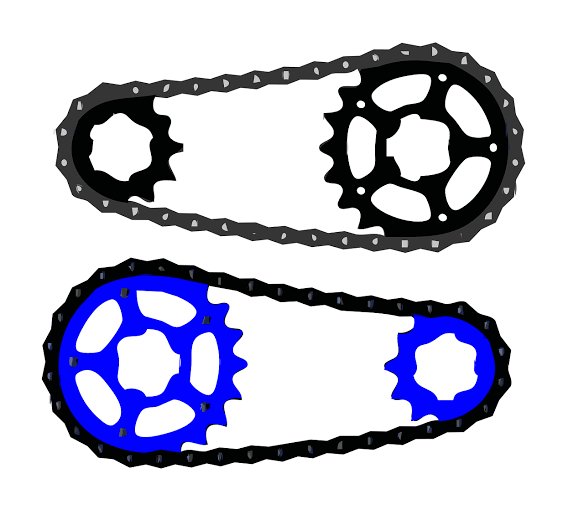
NCERT Solutions For Class 7 English Honeycomb Chapter 9 A Bicycle in Good Repair for revision and better performance in tests and exams. The author, Jerome K Jerome, in this critical humor, shares his experience with his lunatic yet self-confident friend. Below you can find a brief explanation of the NCERT Solutions For Class 7 English Honeycomb Chapter 9 A Bicycle in Good Repair.
Read more: NCERT Solutions For Class 7 English Honeycomb Chapter 5 Quality
Let’s Summarise NCERT Solutions For Class 7 English Honeycomb Chapter 9 A Bicycle in Good Repair
NCERT Solutions For Class 7 English Honeycomb Chapter 9 A Bicycle in Good Repair, A friend of the narrator proposed to him for an early morning bicycle ride which he accepted happily. His excitement was evident by his activities as he woke up earlier than usual and was all set for the ride. The author arrived at the meeting point half an hour before his friend and was waiting for him for a whole hour in the garden.

The author’s friend inquired about his ‘machine‘ and then gave it a violent shake holding its front wheel and the fork. His friend convinced him that his wheel was wobbling and asked the narrator to bring a toolbox. When the author comes back, he sees his friend sitting on the ground with the front wheel between his legs.

His friend didn’t stop there, he moved on to the chain and continued to unscrew something and from somewhere, around a dozen ball bearings came out. His friend insisted that the author must collect all of them else the bicycle might not resort to its earlier condition. The author and his friend limped on the ground looking for the ball bearings for half an hour till they found 16 of them, this time, he safely put them into his cap. The author was now irritated but continued to observe quietly.

Revise Fire and Ice
The author’s friend now started taking off the gear-case. The author dissuaded him from messing up the gear-case as one of his experienced friends had advised him that it’s better to replace the machinery rather than the gearbox as the gear-box replacement is very expensive. Nevertheless, his ravaging friend told him that nothing is as easier as taking off the gear-case. As goes by his words, he took it off easily but had a nightmare while fixing it back to its place. At one point, the author feels to kick the lunatic man out of the gate but he is too emotional that he can’t hurt anyone.

The narrator’s bicycle which was in a very good condition till this morning was now lying scattered divided into many parts. The author wanted to stop his friend from causing further mischief, but he admits that he is weak at hurting others. While fixing back the chain, he tightened it to an extent that it stopped moving and then loosened it until it became twice as loose as it was before.

After applying his ‘skills‘ on the cycle, the author’s friend appeared satisfied with his inspection and now wanted to put the machine altogether. It took a lot of time and a great effort. The process revealed that his friend was inexperienced and had no knowledge of repairing a bicycle. Finally, the cycle was in one piece but its front wheel was wobbling due to the lack of ball bearings. The author took him to his back kitchen where he told him that it was not his ‘mastery‘ that awed him, it was rather his optimistic confidence and baffling hopefulness that mystifies him. Find NCERT Solutions For Class 7 English Honeycomb Chapter 9 A Bicycle in Good Repair below from our expertise.

NCERT Solutions For Class 7 English Honeycomb Chapter 9 A Bicycle in Good Repair
Comprehension Check: NCERT Solutions For Class 7 English Honeycomb Chapter 9 A Bicycle in Good Repair
(Find NCERT Solutions For Class 7 English Honeycomb Chapter 9 A Bicycle in Good Repair below)
Q. 1. “I got up early, for me.” It implies that: (A Bicycle in Good Repair, Pg 128)
- He was an early riser.
- Was a late riser.
- He got up late that morning.
A) 3. He was a late riser.
Q. 2. The bicycle “goes easily enough in the morning and a little stiffly after lunch.” The remark is…? Mark your choice(s). (A Bicycle in Good Repair, Pg 128)
- Humorous
- Inaccurate
- Sarcastic
- Emjoyable
- Meaningless
A) Humorous.
Q. 3. Find two or three sentences in the text which express the author’s disapproval of it. (A Bicycle in Good Repair, Pg 128)
A) The sentences that expresses the disapproval of the author are:
- “Don’t you trouble about it anymore; you will make yourself tired.”
- “Don’t do that; you’ll hurt it.”
- “It doesn’t if you don’t wobble it.”
Q. 4. “ …..if not, it would make a serious difference to the machine.” What does ‘it’ refer to? (A Bicycle in Good Repair, Pg 128)
A) ‘It’ refers to ball bearings which had fallen out of the bicycle.
Working with the Text
(Find NCERT Solutions For Class 7 English Honeycomb Chapter 9 A Bicycle in Good Repair below)
Q. 1. Did the front wheel wobble? What is your opinion? Give a reason for your answer. (A Bicycle in Good Repair)
A) The bicycle was in good condition and the author was pleased with it. The front-wheel did wobble occasionally, but it didn’t need any repair work.
Q. 2. In what condition did the author find the bicycle when he returned from the tool shed? (A Bicycle in Good Repair)
A) When the author returned from the tool shed, his friend had managed to take out the front wheel of the bicycle. His friend was sitting on the ground with the wheel between his legs while the remaining part of the bicycle was lying on the gravel path.
Q. 3. “Nothing is easier than taking off the gear-case.” Comment on or continue this sentence in the light of what happens. (A Bicycle in Good Repair)
A) “Nothing is easier than taking off the gear-case but it is an impossible task to fix it back.” The author’s friend took down the gear-case into two parts easily but he was having a nightmare to fix it back.
Q. 4. What special treatment did the chain receive? (A Bicycle in Good Repair)
A) While fixing the bicycle and its parts, The authors’ friend first tightened it to an extent that it didn’t move at all and then loosened it until it was twice as loose as it was before.
Q. 5. The friend has two qualities—he knows what he is doing and is good. Find the two phrases in the text which mean the same. (A Bicycle in Good Repair)
A) Two phrases from the text that means – he knows what he is doing and is good at cheery confidence and inexplicable hopefulness respectively.
Q. 6. Describe ‘the fight’ between the man and the machine. Find the relevant sentences in the text and write them. (A Bicycle in Good Repair)
A) The narrator’s bicycle was in decent circumstance, but the author’s friend mischievously wrecked it. He first took out the front-wheel and then the gear-case, his next victim was the chain. He took all of them out easily during his inspection but he struggled to fix these parts back into their place. Reference from the text that supports the answer –
- “Then he lost his temper and tried bullying the thing. The bicycle, I was glad to see, showed spirit, and the subsequent proceedings degenerated into little else than a rough and tumble fight between them and the machine. One moment the bicycle would be on the gravel path and he on top of it; the next, the position would be reversed – he on the gravel path, the bicycle on him.”
- “Now he would be standing flushed with victory, the bicycle firmly fixed between his legs. But his triumph would be short-lived. By a sudden, quick movement it would free itself and turn on him, hit him sharply over the head with one of its handles.”
Working with Language
(Find NCERT Solutions For Class 7 English Honeycomb Chapter 9 A Bicycle in Good Repair below)
Q. 1. Read the following sentences.
We should go for a long bicycle ride.
I ought to have been firm.
We mustn’t lose any of them.
I suggested that he should hold the fork and that I should handle the wheel.
The words in italics are modal auxiliaries. Modal auxiliaries are used with verbs to express notions such as possibility, permission, willingness, obligation, a necessity. Should, shouldn’t, ought to generally express moral obligation, necessity, and desirability.
Look at the following.
We should go on a holiday, (suggestion: It is a good idea for us to go on a holiday.)
He is not too well these days. He must see a doctor before he becomes worse, (compulsion or necessity: It is essential or necessary for him to see a doctor.)
You ought to listen to me. I am well over a decade older than you. (more emphatic than ‘should’: Since I am older than you, you should listen to me.)
Note: ‘Should’ and ‘ought to’ are often used interchangeably.
Rewrite each of the following sentences using should / ought to / must in place of the italicized words. Make other changes wherever necessary.
- You are obliged to do your duty irrespective of the consequences.
- You will do well to study at least for an hour every day.
- The doctor says she must sleep eight hours every night.
- It is right that you show respect towards elders and affection towards youngsters.
- If you want to stay healthy, exercise regularly.
- It is good for you to take a walk, every morning.
- It is strongly advised that you don’t stand on your head.
- As he has a cold, he should go. (A Bicycle in Good Repair)
A)
- You must do your duty irrespective of the consequences
- You should study at least for an hour every day.
- The doctor says she must sleep eight hours every night.
- You ought to show respect towards elders and affection towards youngsters.
- To stay healthy, you must exercise regularly.
- You should take a walk, every morning.
- You must not stand on your head.
- As he has a cold, he should go to bed.
Q. 2. Use should/must/ought to appropriately in the following sentences.
- People who live in glass houses ……………….. not throw stones.
- You …………………. wipe your feet before coming into the house, especially during the rains.
- You ……………. do what the teacher tells you.
- The pupils were told that they …………….. write more neatly.
- Sign in front of a park; You …………….. not walk n the grass.
- You ……………… be ashamed of yourself having made such a remark.
- He left home at 9 o’clock. He ………………. be here any minute.
- “Whatever happened to the chocolate cake?” “How ……………. I know? I have just arrived.” (A Bicycle in Good Repair)
A)
- People who live in glass houses should not throw stones.
- You must wipe your feet before coming into the house, especially during the rains.
- You must do what the teacher tells you.
- The pupils were told that they should write more neatly.
- Sign in front of a park; You must not walk in the grass.
- You ought to be ashamed of yourself having made such a remark.
- He left home at 9 o’clock. He should be here any minute.
- “Whatever happened to the chocolate cake?” “How should I know? I have just arrived.”
Q. 3. Two or more single sentences can be combined to form a single sentence.
Read the following.
I made an effort and was pleased with myself. This sentence is in fact a combination of two sentences.
Now read this sentence.
I did not see why he should shake it.
This is also a combination of two sentences.
I did not see (it).
Why should he shake it?
Divide each of the following sentences into its parts. Write meaningful parts. If necessary, supply a word or two to make each part meaningful.
- I went to the tool shed to see what I could find. (3 parts)
- When I came back he was sitting on the ground. (2 parts)
- We may as welt see what’s the matter with it, now it is out. (3 parts)
- He said he hoped we had got them all. (3 parts)
- I had to confess he was right. (2 parts). (A Bicycle in Good Repair)
A)
- I went to the tool shed. I went to see. What could I find?
- I came back. He was sitting on the ground
- We may as well see. What is the matter with it? Now, it is out.
- He said. He hoped. We had got them all.
- I had to confess. He was right.
Q. 4. ‘en’ acts as a prefix (put at the beginning) or as a suffix (put at the end) to form new words.
en + courage = encourage
weak + en = weaken
‘en’ at the beginning of the end of a word is not always a prefix or a suffix.
It is then an integral part of the word ending, barren
(i) Now arrange the words given in the box under the three headings – prefix, suffix, and part of the word. (A Bicycle in Good Repair)
| Encourage | Dampen | Listen |
| Barren | Endanger | Soften |
| Fasten | Enclose | Weaken |
| Even | Enable | Enclave |
A)
| en (Prefix) | en (Suffix) | en (Part of word) |
| Encourage | Fasten | Barren |
| Endanger | Dampen | Even |
| Enclose | Soften | Listen |
| Enable | Weaken | Enclave |
Practice Last Year Question Papers
Conclusion: NCERT Solutions For Class 7 English Honeycomb Chapter 9 A Bicycle in Good Repair
The above written includes the explanation and question answers of NCERT Class 7 English Honeycomb Chapter 9 A Bicycle in Good Repair. Browse our site for various detailed and easy NCERT Solutions For Class 7 English Honeycomb Chapter 9 A Bicycle in Good Repair and CBSE Notes and Comprehensive Summary.